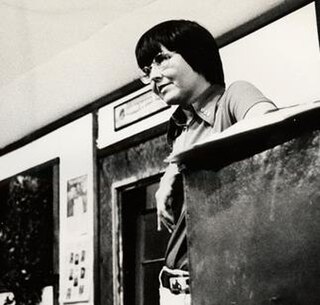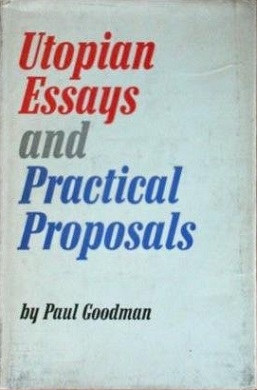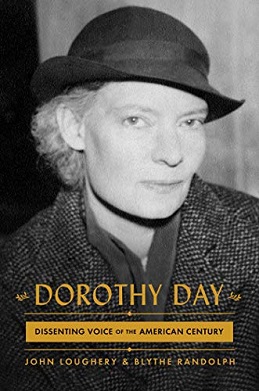
Mere Christianity is a Christian apologetical book by the British author C. S. Lewis. It was adapted from a series of BBC radio talks made between 1941 and 1944, originally published as three separate volumes: Broadcast Talks (1942), Christian Behaviour (1943), and Beyond Personality (1944). The book consists of four parts: the first presents Lewis's arguments for the existence of God; the second contains his defence of Christian theology, including his notable "Liar, lunatic, or Lord" trilemma; the third has him exploring Christian ethics, among which are cardinal and theological virtues; in the final, he writes on the Christian conception of God.

Dorothy Day was an American journalist, social activist and anarchist who, after a bohemian youth, became a Catholic without abandoning her social and anarchist activism. She was perhaps the best-known political radical among American Catholics.

Carson McCullers was an American novelist, short-story writer, playwright, essayist, and poet. Her first novel, The Heart Is a Lonely Hunter (1940), explores the spiritual isolation of misfits and outcasts in a small town of the Southern United States. Her other novels have similar themes and most are set in the Deep South.

Mary Daly was an American radical feminist philosopher and theologian. Daly, who described herself as a "radical lesbian feminist", taught at the Jesuit-run Boston College for 33 years. Once a practicing Roman Catholic, she had disavowed Christianity by the early 1970s. Daly retired from Boston College in 1999, after violating university policy by refusing to allow male students in her advanced women's studies classes. She allowed male students in her introductory class and privately tutored those who wanted to take advanced classes.
Ammon Ashford Hennacy was an American Christian pacifist, anarchist, social activist, and member of the Catholic Worker Movement and Wobbly. He established the Joe Hill House of Hospitality in Salt Lake City, Utah, and practiced tax resistance.
The Catholic Worker is a newspaper published seven times a year by the flagship Catholic Worker community in New York City. The newspaper was started by Dorothy Day and Peter Maurin to make people aware of church teaching on social justice.

Peter Maurin was a French Catholic social activist, theologian, and De La Salle Brother who founded the Catholic Worker Movement in 1933 with Dorothy Day.

Elizabeth Gurley Flynn was an American labor leader, activist, and feminist who played a leading role in the Industrial Workers of the World (IWW). Flynn was a founding member of the American Civil Liberties Union and a visible proponent of women's rights, birth control, and women's suffrage. She joined the Communist Party USA in 1936 and late in life, in 1961, became its chairwoman. She died during a visit to the Soviet Union, where she was accorded a state funeral with processions in Red Square attended by over 25,000 people.

Commonweal is a liberal Catholic journal of opinion, edited and managed by lay people, headquartered in New York City. It is the oldest independent Catholic journal of opinion in the United States.

Lillian Eugenia Smith was a writer and social critic of the Southern United States, known for both her non-fiction and fiction works, including the best-selling novel Strange Fruit (1944). Smith was a White woman who openly embraced controversial positions on matters of race and gender equality. She was a southern liberal who was unafraid to criticize segregation and to work toward the dismantling of Jim Crow laws at a time when such actions virtually guaranteed social ostracism.

Harry Ambrose Sylvester was an American short-story writer and novelist in the first half of the 20th century. His stories were published in popular magazines such as Collier's, Esquire, Columbia, and Commonweal. The most popular of his novels were Dearly Beloved (1942), Dayspring (1945), and Moon Gaffney (1947). He was asked to turn John Steinbeck's script for Alfred Hitchcock's Lifeboat (1944) into a short story. This version was published in Collier's in 1943, with Steinbeck and Hitchcock both receiving writing credits.
Thomas C. Cornell was an American journalist and a peace activist against the Vietnam War and the Iraq War. He was an associate editor of the Catholic Worker and a deacon in the Catholic Church.
Dorothy Marie Donnelly was a poet and essayist, the author of six books of poetry and prose and numerous articles published in Europe and the United States.

Five Years is an autobiographical collection of Paul Goodman's notebooks between 1955 and 1960.

Utopian Essays and Practical Proposals is a 1962 book of essays on social issues by Paul Goodman.

Collected Poems is a book of Paul Goodman's collected poetry, edited by his literary executor Taylor Stoehr and introduced by George Dennison.
George Barry Ford was an American Roman Catholic priest, advocate of civil rights, and the chaplain who, along with Fr. Moore, led Thomas Merton to the Roman Catholic Church. He was twice silenced by Cardinal Francis Spellman, and was a close friend of Eleanor Roosevelt and Carlton J. H. Hayes. Dr. Henry P. Van Dusen, then president of Union Theological Seminary next to Corpus Christi, described Father Ford as "the best known and best loved man in the Morningside Heights community".

Dorothy Day: Dissenting Voice of the American Century is a 2020 biography of Dorothy Day written by John Loughery and Blythe Randolph and published by Simon & Schuster.
The 1949 Calvary Cemetery strike was a labor strike involving gravediggers and other workers at the Calvary Cemetery in Queens, New York City. The strike began on January 13 and ended on March 12,
Rayna Prohme was a journalist who covered the communist movement in China in the late 1920s.












